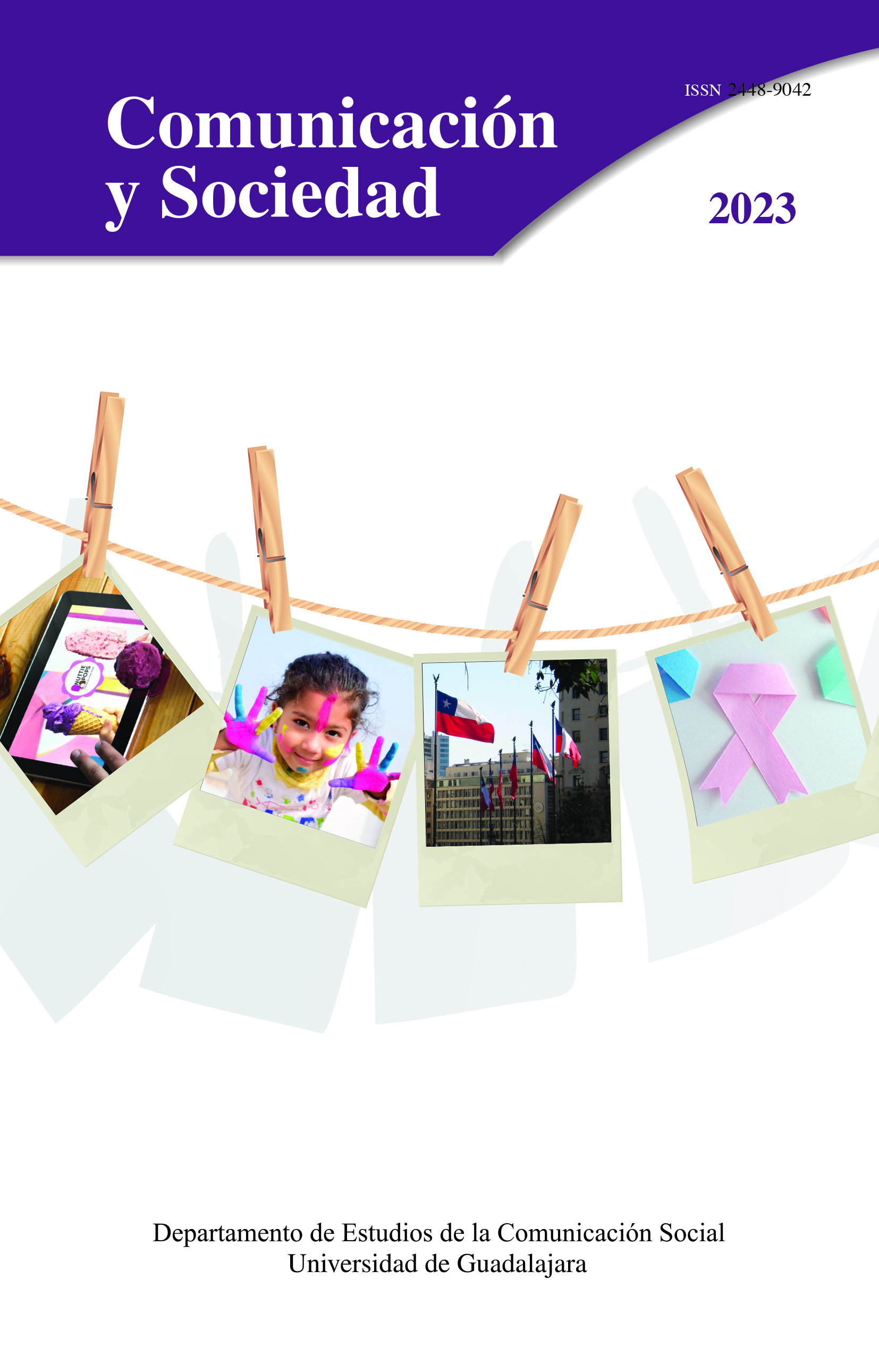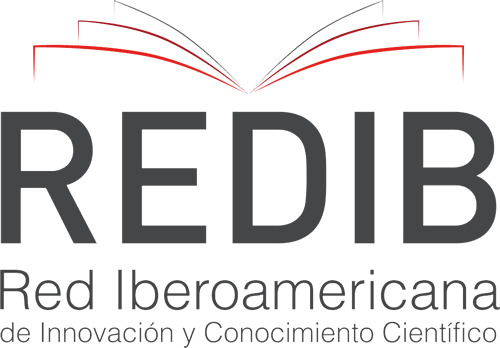Redes sociales y acción colectiva contra el cambio climático en estudiantes universitarios peruanos
DOI:
https://doi.org/10.32870/cys.v2023.8413Palabras clave:
Acción colectiva, Redes sociales, Cambio climático, PerúResumen
El estudio busca analizar si las variables del Modelo de Identidad Social para la Acción Colectiva (SIMCA) median la relación entre el uso de las redes sociales y la acción colectiva ambiental. La investigación usó un diseño correlacional multivariado, basado en el análisis del modelo de ecuaciones estructurales (SEM), con una muestra de 259 estudiantes universitarios peruanos. Se encontró que la eficacia grupal medió la relación entre el uso de redes y los hábitos contra el cambio climático. Además, se halló que la moral, la ira, la identificación con los activistas y la eficacia grupal mediaron parcialmente la relación entre el uso de redes sociales y la acción colectiva virtual contra el cambio climático. Se concluye que la conexión entre las redes y la acción colectiva varía en función del tipo de acción colectiva ambiental.Descargas
Citas
Alberici, A. I. & Milesi, P. (2013). The Influence of the Internet on the Psychosocial Predictors of Collective Action. Journal of Community & Applied Social Psychology, 23(5), 373–388. https://doi.org/10.1002/casp.2131
Alberici, A. I. & Milesi, P. (2018). Online Discussion and the Moral Pathway to Identity Politicization and Collective Action. Europe’s Journal of Psychology, 14(1), 143–158. https://doi.org/10.5964/ejop.v14i1.1507
Anderson, A. (2017). Effects of Social Media Use on Climate Change Opinion, Knowledge, and Behavior. Oxford Research Encyclopedia of Climate Science. https://doi.org/10.1093/acrefore/9780190228620.013.369
Arbuckle, J. L. (2019). IBM SPSS Amos 26, User’s Guide. IBM.
Ballew, M., Omoto, A. & Winter, P. (2015). Using Web 2.0 and Social Media Technologies to Foster Proenvironmental Action. Sustainability, 7(8), 10620–10648. https://doi.org/10.3390/su70810620
Baltes, P. B., Reese, H. W., Nesselroade, J. R. (1981). Métodos de investigación en psicología evolutiva: Enfoque del ciclo vital. Ediciones Morata.
Bamberg, S., Rees, J. & Seebauer, S. (2015). Collective climate action: Determinants of participation intention in community-based pro-environmental initiatives. Journal of Environmental Psychology, 43, 155–165. https://doi.org/10.1016/j.jenvp.2015.06.006
Bandura, A. (2002). Social Cognitive Theory in Cultural Context. Applied Psychology: An International Review, 51(2), 269–290. https://doi.org/10.1111/1464-0597.00092
Barth, M., Jugert, P., Wutzler, M. & Fritsche, I. (2015). Absolute moral standards and global identity as independent predictors of collective action against global injustice. European Journal of Social Psychology, 45(7), 918–930. https://doi.org/10.1002/ejsp.2160
Brechin, S. (2016). Climate Change Mitigation and the Collective Action Problem: Exploring Country Differences in Greenhouse Gas Contributions. Sociological Forum, 31(S1), 846–861. https://doi.org/10.1111/socf.12276
Brügger, A., Gubler, M., Steentjes, K. & Capstick, S. (2020). Social Identity and Risk Perception Explain Participation in the Swiss Youth Climate Strikes. Sustainability, 12(24), 10605. https://doi.org/10.3390/su122410605
Brunsting, S. & Postmes, T. (2002). Social Movement Participation in the Digital Age: Predicting Offline and Online Collective Action. Small Group Research, 33(5), 525–554. https://doi.org/10.1177/104649602237169
Chan, M. (2017). Media Use and the Social Identity Model of Collective Action: Examining the Roles of Online Alternative News and Social Media News. Journalism & Mass Communication Quarterly, 94(3), 663–681. https://doi.org/10.1177/1077699016638837
Cmeciu, C. & Coman, C. (2016). Activismo cívico digital en Rumanía: La comunidad de Facebook en las protestas on-line contra Chevron. Comunicar: Revista Científica de Comunicación y Educación, 24(47), 19–28. https://doi.org/10.3916/C47-2016-02
Cody, E., Reagan, A., Mitchell, L., Dodds, P. S. & Danforth, C. (2015). Climate Change Sentiment on Twitter: An Unsolicited Public Opinion Poll. PLOS ONE, 10(8), e0136092. https://doi.org/10.1371/journal.pone.0136092
Drury, J., Brown, R., González, R. & Miranda, D. (2016). Emergent social identity and observing social support predict social support provided by survivors in a disaster: Solidarity in the 2010 Chile earthquake. European Journal of Social Psychology, 46(2), 209–223. https://doi.org/10.1002/ejsp.2146
Drury, J., Carter, H., Cocking, C., Ntontis, E., Tekin Guven, S. & Amlôt, R. (2019). Facilitating Collective Psychosocial Resilience in the Public in Emergencies: Twelve Recommendations Based on the Social Identity Approach. Frontiers in Public Health, 7. https://www.frontiersin.org/article/10.3389/fpubh.2019.00141
Furlong, C. & Vignoles, V. (2021). Social Identification in Collective Climate Activism: Predicting Participation in the Environmental Movement, Extinction Rebellion. Identity, 21(1), 20–35. https://doi.org/10.1080/15283488.2020.1856664
García-Galera, M.-C., del-Hoyo-Hurtado, M. & Fernández-Muñoz, C. (2014). Jóvenes comprometidos en la Red: El papel de las redes sociales en la participación social activa. Comunicar: Revista Científica de Comunicación y Educación, 22(43), 35–43. https://doi.org/10.3916/C43-2014-03
Gates, B. (2021). Cómo evitar un desastre climático: Las soluciones que ya tenemos y los avances que aún necesitamos (1era ed.). Plaza & Janés.
Gerbaudo, P. (2016). Rousing the Facebook Crowd: Digital enthusiasm and emotional contagion in the 2011 protests in Egypt and Spain. International Journal of Communication, 10, 254–273. https://ijoc.org/index.php/ijoc/article/view/3963
Greijdanus, H., de Matos Fernandes, C., Turner-Zwinkels, F., Honari, A., Roos, C., Rosenbusch, H. & Postmes, T. (2020). The psychology of online activism and social movements: Relations between online and offline collective action. Current Opinion in Psychology, 35, 49–54. https://doi.org/10.1016/j.copsyc.2020.03.003
Halpern, D., Valenzuela, S. & Katz, J. (2017). We Face, I Tweet: How Different Social Media Influence Political Participation through Collective and Internal Efficacy. Journal of Computer-Mediated Communication, 22(6), 320–336. https://doi.org/10.1111/jcc4.12198
Higham, J., Ellis, E. & Maclaurin, J. (2019). Tourist Aviation Emissions: A Problem of Collective Action. Journal of Travel Research, 58(4), 535–548. https://doi.org/10.1177/0047287518769764
Hoffmann, C. P. & Lutz, C. (2019). Digital Divides in Political Participation: The Mediating Role of Social Media Self‐Efficacy and Privacy Concerns. Policy & Internet, 13(1), 6–29. https://doi.org/10.1002/poi3.225
Instituto Nacional de Estadística e Informática. (2020). Estadísticas de las Tecnologías de Información y Comunicación en los hogares. https://www.inei.gob.pe/media/MenuRecursivo/boletines/boletin_tics.pdf
Jugert, P., Greenaway, K., Barth, M., Büchner, R., Eisentraut, S. & Fritsche, I. (2016). Collective efficacy increases pro-environmental intentions through increasing self-efficacy. Journal of Environmental Psychology, 48, 12–23. https://doi.org/10.1016/j.jenvp.2016.08.003
Landmann, H. & Rohmann, A. (2020). Being moved by protest: Collective efficacy beliefs and injustice appraisals enhance collective action intentions for forest protection via positive and negative emotions. Journal of Environmental Psychology, 71, 101491. https://doi.org/10.1016/j.jenvp.2020.101491
Lee, F., Chen, H.-T. & Chan, M. (2017). Social media use and university students’ participation in a large-scale protest campaign: The case of Hong Kong’s Umbrella Movement. Telematics and Informatics, 34(2), 457–469. https://doi.org/10.1016/j.tele.2016.08.005
Liu, J. (2016). Digital Media, Cycle of Contention, and Sustainability of Environmental Activism: The Case of Anti-PX Protests in China. Mass Communication and Society, 19(5), 604–625. https://doi.org/10.1080/15205436.2016.1203954
Mavrodieva, A., Rachman, O., Harahap, V. & Shaw, R. (2019). Role of Social Media as a Soft Power Tool in Raising Public Awareness and Engagement in Addressing Climate Change. Climate, 7(10), 122. https://doi.org/10.3390/cli7100122
Ministerio del Ambiente. (2019). Cambio Climático y Desarrollo Sostenible en el Perú. https://www.gob.pe/institucion/minam/informes-publicaciones/306347-cambio-climatico-y-desarrollo-sostenible-en-el-peru
Odağ, Ö., Melis Uluğ, Ö. & Solak, N. (2016). “Everyday I’m Çapuling”. Journal of Media Psychology, 28(3), 148–159. https://doi.org/10.1027/1864-1105/a000202
Poore, J. & Nemecek, T. (2018). Reducing food’s environmental impacts through producers and consumers. Science, 360(6392), 987–992. https://doi.org/10.1126/science.aaq0216
Preacher, K. J. & Hayes, A. F. (2004). spss and sas Procedures for Estimating Indirect Effects in Simple Mediation Models. Behavior Research Methods, Instruments, & Computers, 36(4), 717-731. https://doi.org/10.3758/BF03206553
Revelle, W. & Condon, D. M. (2018). Reliability from alpha to omega: a tutorial. https://doi.org/10.31234/osf.io/2y3w9
Ruiz-Dodobara, F., Escurra Mayaute, L. M. & Angeletti, A. A. (2021). Ciberactivismo, autoeficacia del uso de Facebook y acción colectiva en estudiantes universitarios peruanos. 2021 16th Iberian Conference on Information Systems and Technologies (cisti), 1–7. https://doi.org/10.23919/CISTI52073.2021.9476355
Sandström, V., Valin, H., Krisztin, T., Havlík, P., Herrero, M. & Kastner, T. (2018). The role of trade in the greenhouse gas footprints of EU diets. Global Food Security, 19, 48–55. https://doi.org/10.1016/j.gfs.2018.08.007
Schmitt, M., Mackay, C., Droogendyk, L. & Payne, D. (2019). What predicts environmental activism? The roles of identification with nature and politicized environmental identity. Journal of Environmental Psychology, 61, 20–29. https://doi.org/10.1016/j.jenvp.2018.11.003
Şen, A. F. & Şen, Y. F. (2016). Online environmental activism in Turkey: The case study of “The Right to Water”. Global Bioethics, 27(1), 1–21. https://doi.org/10.1080/11287462.2015.1137184
Soper, D. S. (2022). A-priori Sample Size Calculator for Structural Equation Models [Software]. https://www.danielsoper.com/statcalc
Swim, J., Geiger, N. & Lengieza, M. (2019). Climate Change Marches as Motivators for Bystander Collective Action. Frontiers in Communication, 4. https://www.frontiersin.org/article/10.3389/fcomm.2019.00004
Thomas, E. F., Zubielevitch, E., Sibley, C. & Osborne, D. (2020). Testing the Social Identity Model of Collective Action Longitudinally and Across Structurally Disadvantaged and Advantaged Groups. Personality and Social Psychology Bulletin, 46(6), 823–838. https://doi.org/10.1177/0146167219879111
Törnberg, P. (2018). Echo chambers and viral misinformation: Modeling fake news as complex contagion. PLOS ONE, 13(9), e0203958. https://doi.org/10.1371/journal.pone.0203958
Vaccari, C., Valeriani, A., Barberá, P., Bonneau, R., Jost, J., Nagler, J. & Tucker, J. A. (2015). Political Expression and Action on Social Media: Exploring the Relationship Between Lower- and Higher-Threshold Political Activities Among Twitter Users in Italy. Journal of Computer-Mediated Communication, 20(2), 221–239. https://doi.org/10.1111/jcc4.12108
Valenzuela, S. (2013). Unpacking the Use of Social Media for Protest Behavior: The Roles of Information, Opinion Expression, and Activism. American Behavioral Scientist, 57(7), 920–942. https://doi.org/10.1177/0002764213479375
van Zomeren, M. (2013). Four Core Social-Psychological Motivations to Undertake Collective Action. Social and Personality Psychology Compass, 7(6), 378–388. https://doi.org/10.1111/spc3.12031
van Zomeren, M., Pauls, I. L. & Cohen-Chen, S. (2019). Is hope good for motivating collective action in the context of climate change? Differentiating hope’s emotion- and problem-focused coping functions. Global Environmental Change, 58, 101915. https://doi.org/10.1016/j.gloenvcha.2019.04.003
van Zomeren, M., Postmes, T., Spears, R. & Bettache, K. (2011). Can moral convictions motivate the advantaged to challenge social inequality?: Extending the social identity model of collective action. Group Processes & Intergroup Relations, 14(5), 735–753. https://doi.org/10.1177/1368430210395637
van Zomeren, M., Postmes, T. & Spears, R. (2012). On conviction’s collective consequences: Integrating moral conviction with the social identity model of collective action. British Journal of Social Psychology, 51(1), 52–71. https://doi.org/10.1111/j.2044-8309.2010.02000.x
Vezzali, L., Cadamuro, A., Versari, A., Giovannini, D. & Trifiletti, E. (2015). Feeling like a group after a natural disaster: Common ingroup identity and relations with outgroup victims among majority and minority young children. British Journal of Social Psychology, 54(3), 519–538. https://doi.org/10.1111/bjso.12091
Viladrich, C., Angulo-Brunet, A. & Doval, E. (2017). Un viaje alrededor de alfa y omega para estimar la fiabilidad de consistencia interna. Anales de Psicología / Annals of Psychology, 33(3), 755–782. https://doi.org/10.6018/analesps.33.3.268401
Wallis, H. & Loy, L. (2021). What drives pro-environmental activism of young people? A survey study on the Fridays For Future movement. Journal of Environmental Psychology, 74, 101581. https://doi.org/10.1016/j.jenvp.2021.101581
Wamuyu, P. K. (2018). Leveraging Web 2.0 technologies to foster collective civic environmental initiatives among low-income urban communities. Computers in Human Behavior, 85, 1–14. https://doi.org/10.1016/j.chb.2018.03.029
Yarchi, M., Baden, C. & Kligler-Vilenchik, N. (2021). Political Polarization on the Digital Sphere: A Cross-platform, Over-time Analysis of Interactional, Positional, and Affective Polarization on Social Media. Political Communication, 38(1–2), 98–139. https://doi.org/10.1080/10584609.2020.1785067
Descargas
Publicado
Cómo citar
Número
Sección
Licencia

Esta obra está bajo una licencia internacional Creative Commons Atribución-NoComercial 4.0.
Los autores/as que publiquen en esta revista aceptan las siguientes condiciones:
De acuerdo con la legislación de derechos de autor, los autores conservan los derechos de autoría y otorgan a Comunicación y Sociedad el derecho de primera comunicación pública de la obra. Comunicación y Sociedad no realiza cargos a los autores por enviar y procesar artículos para su publicación.
Los autores/as pueden realizar otros acuerdos contractuales independientes y adicionales para la distribución no exclusiva de la versión del artículo publicado en Comunicación y Sociedad (por ejemplo incluirlo en un repositorio institucional o publicarlo en un libro) siempre que indiquen claramente que el trabajo se publicó por primera vez en Comunicación y Sociedad.











